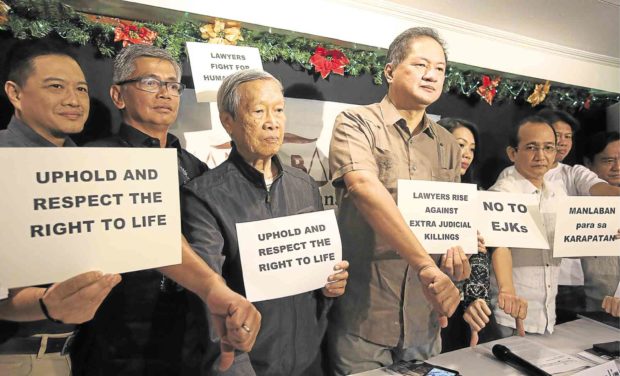Legal eagles lead anti-EJK alliance

NO TO EJK Lawyers, law professors, judges and law students opposed to human rights violations under the Duterte administration launch the Mga Manananggol Laban sa Extrajudicial Killings in Quezon City. —JOAN BONDOC
Lawyers have announced a broad alliance challenging President Duterte’s brutal war on drugs, which has killed thousands of mostly urban poor Filipinos.
Police say the killings were carried out by officers in self-defense after the drug suspects resisted arrest.
Critics dispute that claim and say extrajudicial killings (EJKs) are taking place, with zero accountability.
Mga Manananggol Laban sa Extrajudicial Killings (Manlaban sa EJK) on Thursday joined a growing chorus of voices calling on the Duterte administration to end the campaign.
Human rights violations
Article continues after this advertisementManlaban sa EJK is composed of lawyers, law professors, judges and law students opposed to human rights violations under the Duterte administration.
Article continues after this advertisementOrganizers include former University of the Philippines College of Law dean Pacifico Agabin, Free Legal Assistance Group (FLAG) chair Jose Manuel Diokno, former Ateneo School of Government dean Antonio La Viña, former Sen. Rene Saguisag, former Quezon Rep. Lorenzo Tañada III, and National Union of People’s Lawyers (NUPL) president Edre Olalia.
At the launch of the group in Quezon City on Thursday, Olalia said the alliance aimed to unite lawyers and coordinate their actions in defense of human rights.
“We believe the duty of lawyers is not to apologize, deodorize [or] rationalize violations of rights and due process,” Olalia said.
“It is the duty of all lawyers to consistently and uncompromisingly uphold and defend human rights no matter what temporary and fleeting positions and circumstances may bring,” he added.
Mr. Duterte’s incoming spokesperson, Harry Roque Jr., a congressman and human rights lawyer, denied rights violations on the part of the President but welcomed the formation of the new group, saying it could help gather evidence against law enforcers allegedly behind the unlawful killings.
“I welcome this development because unless we can come up with actual evidence that there really are extralegal killings, then we cannot overcome the presumption of regularity [in the discharge of official functions],” Roque told reporters.
The killings in the antidrug war are presumed legal unless there was contravening evidence, he said.
Roque said the President’s position that he “will not tolerate murders” was clear.
“He will only tolerate killings when it is in line with duty and when the engagement is legal,” said Roque, who had prosecuted on behalf of murdered journalists.
The lawyers said Manlaban sa EJK would spearhead advocacy campaigns and mobilization in defense of human rights, as well as issue legal statements and opinion.
Personal capacities
The alliance also counts as members law student groups, including the Association of Law Students in the Philippines, UP Diliman College of Law Student Government, Paralegal Volunteers Organization-UP Diliman and NUPL-UP Diliman chapter.
Although coming from different organizations, the organizers said they joined forces on their personal capacities.
“This is not partisan in the sense that it is political or [colored],” La Viña said. “We are doing this to uphold human rights, not to use it as a political weapon.”
The lawyers said they would extend legal assistance to families of drug war victims.
They estimate that 12,000 people have been killed in just one year, although the Philippine National Police acknowledges only 3,800 deaths in its antidrug operations.
There are EJKs
Manlaban sa EJK disputed the PNP claim that there were no extrajudicial killings in Mr. Duterte’s war on drugs.
“Extrajudicial killings are crimes done by state agents, like the military, the police, even private individuals who are induced by the government,” said Agabin, a constitutional law expert.
“Whoever is the Commander in Chief, if there are patterns in the killings and the Commander in Chief is not doing anything, then he is responsible under the concept of command responsibility,” he said.
According to La Viña, killings directly committed or sanctioned by the state and those not being investigated by the state are extrajudicial killings.
In a separate interview with the Inquirer, La Viña said the government must release the results of its investigation of “nanlaban” cases.